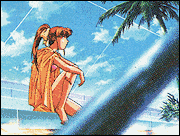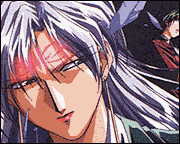 |


Copyright © Studio Tron, Kadokawa Shoten/Bandai Visual, Sotsu Agency, TV Tokyo
Broadcast Time:
Tuesdays 18:00-18:30
Broadcast Station:
TV Tokyo |
 |


—by Ivevei Upatkoon
SILENT MOBIUS is a manga series by Asamiya Kia which has been running for
years and is scheduled
for completion in the near future. For this reason, it has been made into a
TV series that promises a conclusion (of sorts, since the manga still shows
no sign of ending). While the production crew is different from the two
movies released previously, the original voice actresses reprise their
roles as the women of the AMP.
 For those unfamiliar with the manga, the premise is as follows: at
present, the earth is an environmental disaster where humans live in
crowded cities. However, the story really begins in the year 2006, when a
man named Gigelf Liquer sacrifices his life under mysterious circumstances
to seal this world from invasion by powerful creatures from another
dimension. But these Lucifer Folk, as they are called, are starting to
cross over and cause supernatural incidents. Enter the AMP, Attacked
Mystification Police, a section of Tokyo's police dedicated to
investigating and eradicating Lucifer Folk. Created and headed by Rally
Cheyenne in 2024, the AMP is made up of six young women with
considerable powers of their own. One of these women is Katsumi Liquer,
daughter of Gigelf. As the story progresses, she learns to control her
formidable magical abilities while discovering the reasons behind her
father's death and the nature of the Lucifer Folk. For those unfamiliar with the manga, the premise is as follows: at
present, the earth is an environmental disaster where humans live in
crowded cities. However, the story really begins in the year 2006, when a
man named Gigelf Liquer sacrifices his life under mysterious circumstances
to seal this world from invasion by powerful creatures from another
dimension. But these Lucifer Folk, as they are called, are starting to
cross over and cause supernatural incidents. Enter the AMP, Attacked
Mystification Police, a section of Tokyo's police dedicated to
investigating and eradicating Lucifer Folk. Created and headed by Rally
Cheyenne in 2024, the AMP is made up of six young women with
considerable powers of their own. One of these women is Katsumi Liquer,
daughter of Gigelf. As the story progresses, she learns to control her
formidable magical abilities while discovering the reasons behind her
father's death and the nature of the Lucifer Folk.
|
 |
 |




 |
 |
 Of course, SILENT MOBIUS's strength lies with the women of the AMP as much as
it does with the plot. As leader, Rally is mysterious, cold, and
determined. Katsumi is powerful but headstrong and tends to disobey orders.
Lebia is the resident technowizard and hacker with a somewhat standoffish
attitude and her own personal laser satellite. Kiddy, too, has no magical
powers, but, with her cyborg body, she is the brawn of the team. Nami is the
traditional Japanese Shinto priestess whose family has fought the
supernatural for
countless generations. And last of all, there is Yuki, the youngest. While
not possessing any powers that are useful in combat, she does have
precognition and other psychic abilities that manifest themselves every
once in a while. Of course, SILENT MOBIUS's strength lies with the women of the AMP as much as
it does with the plot. As leader, Rally is mysterious, cold, and
determined. Katsumi is powerful but headstrong and tends to disobey orders.
Lebia is the resident technowizard and hacker with a somewhat standoffish
attitude and her own personal laser satellite. Kiddy, too, has no magical
powers, but, with her cyborg body, she is the brawn of the team. Nami is the
traditional Japanese Shinto priestess whose family has fought the
supernatural for
countless generations. And last of all, there is Yuki, the youngest. While
not possessing any powers that are useful in combat, she does have
precognition and other psychic abilities that manifest themselves every
once in a while.
 The TV series follows the setup of the movies in that it starts off right
before Katsumi joins AMP. Now, one big problem with the movies is that
Katsumi suffers quite badly from "Nagisa syndrome," the tendency to
whine incessantly about not wanting to fight (as exhibited by the
aforementioned character of the ICZER series). The TV series follows the setup of the movies in that it starts off right
before Katsumi joins AMP. Now, one big problem with the movies is that
Katsumi suffers quite badly from "Nagisa syndrome," the tendency to
whine incessantly about not wanting to fight (as exhibited by the
aforementioned character of the ICZER series).
 For this reason, this reviewer was extremely wary of the latest
reincarnation of SILENT MOBIUS, but luckily Katsumi is not as petulant. Her
induction is covered in the first two episodes and the whining, while
present, is thankfully bearable. While only four episodes have been broadcasted
to date, this series seems to be moving pretty fast. Each episode develops
both plot and characters satisfactorily. Compared to the manga, the basic
elements, characterizations, and storyline are the same, but the
presentation differs, making for a series that is interesting to watch,
yet comfortably familiar. For this reason, this reviewer was extremely wary of the latest
reincarnation of SILENT MOBIUS, but luckily Katsumi is not as petulant. Her
induction is covered in the first two episodes and the whining, while
present, is thankfully bearable. While only four episodes have been broadcasted
to date, this series seems to be moving pretty fast. Each episode develops
both plot and characters satisfactorily. Compared to the manga, the basic
elements, characterizations, and storyline are the same, but the
presentation differs, making for a series that is interesting to watch,
yet comfortably familiar.
 On the technical side, SILENT MOBIUS is a solid anime. The actual animation
in the episodes is not outstanding, but it is not sub-par either. The
opening is actually very impressive. High quality CG combined with some
excellent animation and good choreography make for a visual feast. Overall,
I was hoping for higher animation quality, but it seems it is not going to
be. The character designs are no longer by Kikuchi Michitaka, so they
are slightly different, but to be honest they are close enough that
there are no complaints. I am glad that these designs stick to the "small eyes
that are not on the character's forehead" look that marked the movies, as
opposed to the manga-style version. On the technical side, SILENT MOBIUS is a solid anime. The actual animation
in the episodes is not outstanding, but it is not sub-par either. The
opening is actually very impressive. High quality CG combined with some
excellent animation and good choreography make for a visual feast. Overall,
I was hoping for higher animation quality, but it seems it is not going to
be. The character designs are no longer by Kikuchi Michitaka, so they
are slightly different, but to be honest they are close enough that
there are no complaints. I am glad that these designs stick to the "small eyes
that are not on the character's forehead" look that marked the movies, as
opposed to the manga-style version.
 There is some good music in this show as well—not quite techno, but very
electronic and with a strong beat. I thought the insertion during action
scenes is well done and appropriate. The opening theme is good but leaves
no lasting impression, but I do not like the ending theme at all since I
usually shy away from English songs in anime. Your mileage may vary on this. There is some good music in this show as well—not quite techno, but very
electronic and with a strong beat. I thought the insertion during action
scenes is well done and appropriate. The opening theme is good but leaves
no lasting impression, but I do not like the ending theme at all since I
usually shy away from English songs in anime. Your mileage may vary on this.
 However, I think the biggest asset to this show is the inclusion of humor.
The first two episodes took themselves very seriously, and as such were
just a little cliched and corny, but the next two had a lighter tone
that made them fun to watch. The expressions on the faces of the characters
are unrealistic, but instead of being out of place, they really are funny.
It breaks the monotony and sets a frame where we no longer expect the anime
to be true-to-life; hence, it is easier to accept the manga-esque
characterizations that we would otherwise deem shallow or exaggerated. However, I think the biggest asset to this show is the inclusion of humor.
The first two episodes took themselves very seriously, and as such were
just a little cliched and corny, but the next two had a lighter tone
that made them fun to watch. The expressions on the faces of the characters
are unrealistic, but instead of being out of place, they really are funny.
It breaks the monotony and sets a frame where we no longer expect the anime
to be true-to-life; hence, it is easier to accept the manga-esque
characterizations that we would otherwise deem shallow or exaggerated.
 This probably need not be said, but fans of the original manga series or
the movies definitely do not want to overlook this show; it is
reasonably well executed within the confines of Asamiya's creation. Its
action-packed nature and futuristic feel should also appeal to those who
enjoy cyberpunk anime like BUBBLEGUM CRISIS. Viewers who are tired of the old
girls-with-guns genre though, will probably want to give this a pass since the
story does not bring anything really fresh into the
field. This probably need not be said, but fans of the original manga series or
the movies definitely do not want to overlook this show; it is
reasonably well executed within the confines of Asamiya's creation. Its
action-packed nature and futuristic feel should also appeal to those who
enjoy cyberpunk anime like BUBBLEGUM CRISIS. Viewers who are tired of the old
girls-with-guns genre though, will probably want to give this a pass since the
story does not bring anything really fresh into the
field.  |
 |






